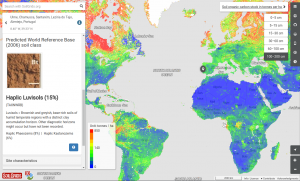Data Champion ISRIC: “Harmonizing world soil information”
ISRIC, the international centre for world soil information, is a pioneer when it comes to Data Management. ISRIC has worked on compiling and harmonising data on soils for over 50 years. It makes the data available in a FAIR manner and supports open data where possible. ISRIC is therefore a real WUR Data Champion. Luís de Sousa, PhD in Computer Science, tells us more.

Luis de Sousa
ISRIC
Since 1989, ISRIC has been an independent foundation that provides quality-assessed soil data and interprets world soil information. ISRIC collaborates on several externally funded and co-funded international research projects. Luís explains: “We are not a research institute, but we do a lot of research relevant work and also publish articles.” Although ISRIC is an independent foundation, WUR is proud to have ISRIC on its Campus. As a member of the WUR family, ISRIC has access to WUR IT facilities and to Data Management Support.
During research: working with big data
During research, researchers and guest-researchers store their data on a local ISRIC server. Access to the folders and files is project-specific and limited to project leaders and project members. SoilGrids (the output of a system for automated global soil mapping) are the main products. “Our work requires vast amounts of storage space, and high memory. A single SoilGrids version occupies over 400 GB of disk space. Soil mapping can take over one month of computing, and therefore, ISRIC hires specific hardware for that purpose for limited periods. We are now looking into the possibility of using Agrogenomics HPC (High Performance Computing) for processing. Due to the size of the datasets we host , but also to data security reasons, USBs or hard discs are no solution for us.”

SoilGrid
The WUR Research Data Policy does not allow data storage on USB and hard disks. This is for data security and continuity reasons. Data storage on local servers is allowed, provided that WUR IT supports the server implementation and guarantees the data security. For more information on the storage policy click here
After research: the ISRIC-repository and database
ISRIC offers a central location for searching and downloading soil data from all over the world: the ISRIC Soil Data Hub. Through this data hub, users can search in the World Soil Information Service (WoSIS), but also in Africa Soil Grids, SOTER, WISE, etc. ISRIC archives all its data in one of these databases and makes these available through the ISRIC Data Hub. As part of this process, the data are quality-assessed and standardised. The ISRIC data repositories follow a Data and Software Policy, which describes these procedures. The ISRIC repositories meet sustainability standards and the F and A of the FAIR principles.
ISRIC also encourages non-ISRIC soil data to be submitted to the ISRIC data repository.
According to the WUR data policy, research data which underlie a publication must be stored in a reliable data archive (which meets the FAIR criteria). Many domain archives are available, and within the Netherlands, there are also two important generic data archives. Data Management Support can assist you in archiving your data.
Facilitating data reuse
To encourage sharing of data, ISRIC adds data licences to the data where possible – this may be Creative Commons (CC) licences or the Open Database License (ODbL). This ensures that users know what rights they have over the data – if they can share it, adapt it, etcetera.
Luís further elaborates: “Our core business is to harmonize soil profiles and produce the maps. All of our final products are in open formats, and everything is made available on the internet. Researchers can work with the data immediately. We also list our publications and add the links between datasets and publications.” ISRIC also contributed to the development of a framework for standardizing world soil data.
WUR is serious about data
With this series on WUR Data Champions, we show you how some pioneers within our organization work on the implementation of the new RDM policy. Even though ISRIC is not part of WUR, as one of the Campus organisations, they show a shining example of sustainable Data Management. Especially in the aspect of data archiving. Please also read the blogposts on the other WUR data champions. And stay tuned: more data champions are to come!
Data Management Support
Do not hesitate to contact Data Management Support with any questions you may have. You can also join the Research Data Management group on Intranet to stay informed.


This is good job.
How can my University partner with your university,especially in the area of data storage?
You may contact ISRIC through https://www.isric.online/contact-us
This good.